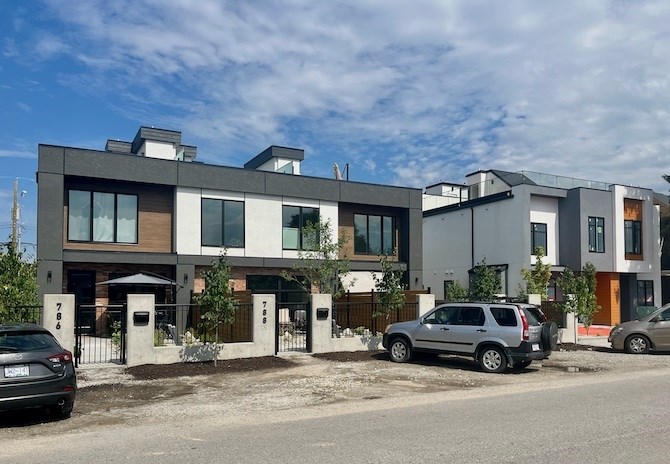Is the province overstepping its authority by imposing four-plexes province-wide?

New legislation proposed for this fall will allow people to build four-plexes on most single-family lots in the province.
Having that imposed by the province does not sit well with some local politicians.
“Probably the majority, if not all, of the municipalities across the province are contemplating whether or not the province is overstepping municipal authority with regards to changes to so many bylaw regulations,” West Kelowna Mayor Gord Milsom told iNFOnews.ca. “We will have an opportunity to review that as time goes by.”
The announcement of the Homes for People changes were made by Premier Dave Eby, April 3. Many mayors and other politicians were at a B.C. Union of B.C. Municipalities Housing Summit in Vancouver where the changes will likely be a hot topic of discussion.
“I think for the last – lets pick a number – 100 years, the courts throughout North America always recognized that the authority for land use decisions is the local government,” Ron Mattiussi, former City of Kelowna City Manager and current advisor to many B.C. municipalities, told iNFOnews.ca. “I don’t recall the decisions on land use ever being anything other than a local government decision.
“The courts never interfere with the decisions of councils. They may interfere with how you made the decision. Was it fair? Was it due process? Did you follow the guidelines? But they never intervene and say, no you can’t zone that way.”
That could all change, depending on the details of the new legislation.
As Milsom understands the proposal, up to four units will be allowed on most single-family lots and up to three on smaller single-family lots.
It’s also not clear to him that the rules will apply to all parts of the province.
“We’ll have to wait to see what the details are,” Milsom said.
His city is in the final stages of revising its Official Community Plan. That process included extensive public consultation and is designed to represent the vision West Kelowna residents have for their city.
Does that mean their vision is now irrelevant as the province dictates land use?
“We’ll have to wait and see how that develops,” Milsom said. “There’s a lot of question marks. There’s a lot involved in regulating land and buildings and other structures. It’s too early to make a comment on it.”
Despite the long history of local governments having the final say over land use, Mattiussi doesn’t believe the province is overstepping its authority.
“I don’t think anybody can challenge the province’s ability to do this in that we are creatures of the province,” he said.
It has the power to write legislation and, for that reason, the changes aren’t likely to be challenged in court, he said, with the caveat that he’s not a lawyer.
“I have mixed emotions,” Mattiussi said of the Homes for People approach. “I don’t like that they did it, just in principle, because of the principle that local governments have always been the decision making body. But what they’re enacting makes some sense.”
Some communities fight hard against housing developments despite the dire need. Others put in layers of unnecessary rules that slow down the application process and there are a multitude of different approaches to zoning around the province.
“What people aren’t seeing is, we have this piling on of community values that we’re trying to protect,” Mattiussi said. ”The process now is quite onerous. We’ve lost sight of the fact that, just to get something done, you’re going through a myriad of steps, not all of which are really necessary.”
Eby pointed that out in his press conference. He said it can take two or three years to get approval to build a carriage house, which is a more affordable form of housing. Yet, to tear down a single-family home to build a bigger one takes a fraction of the time and doesn't require the same kind of approvals.
READ MORE: Premier Eby clearing local government hurdles for more housing
North Americans have taken the separation of land uses into separate categories to an unnecessary extreme, Mattiussi said.
“I think our bylaws are too restrictive,” he said. “If you’re in Germany, for instance, your residential zone could include workspaces, businesses and multiple forms of housing.”
For that reason he applauds Eby’s approach.
“We do need to streamline our process,” Mattiussi said. “But, the province’s better approach would have been to say: ‘You have a year to get your zoning bylaws to be more inclusive and less exclusive. You figure out how you do it.’”
To contact a reporter for this story, email Rob Munro or call 250-808-0143 or email the editor. You can also submit photos, videos or news tips to the newsroom and be entered to win a monthly prize draw.
We welcome your comments and opinions on our stories but play nice. We won't censor or delete comments unless they contain off-topic statements or links, unnecessary vulgarity, false facts, spam or obviously fake profiles. If you have any concerns about what you see in comments, email the editor in the link above.



